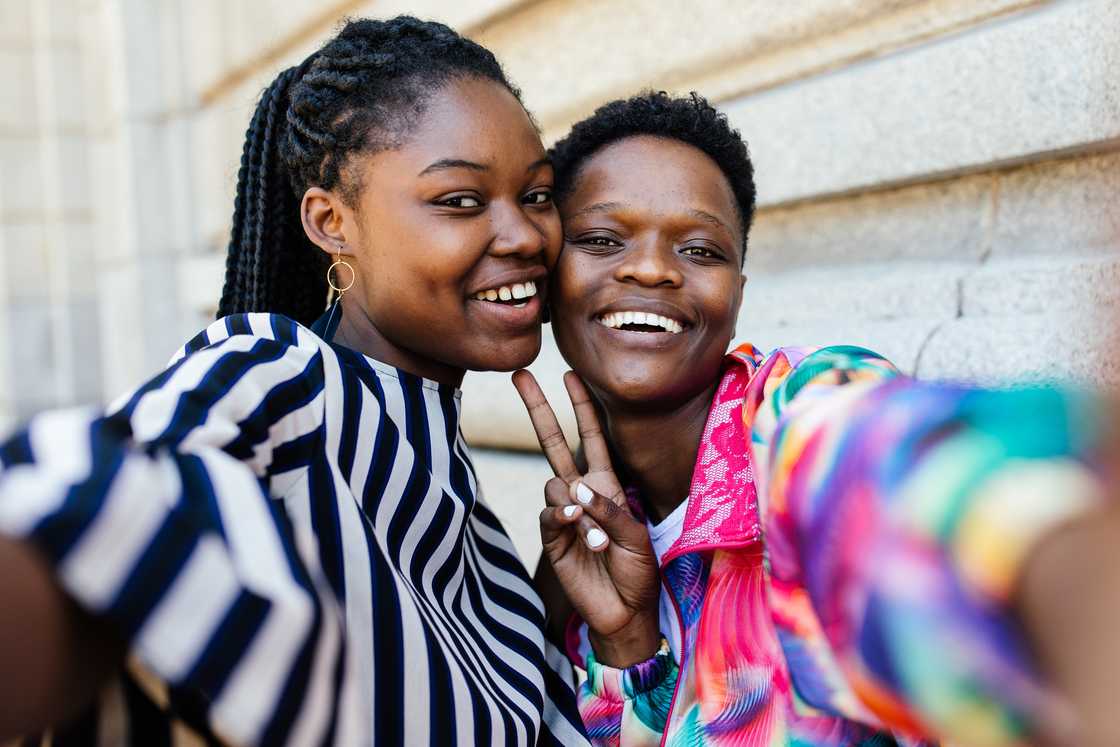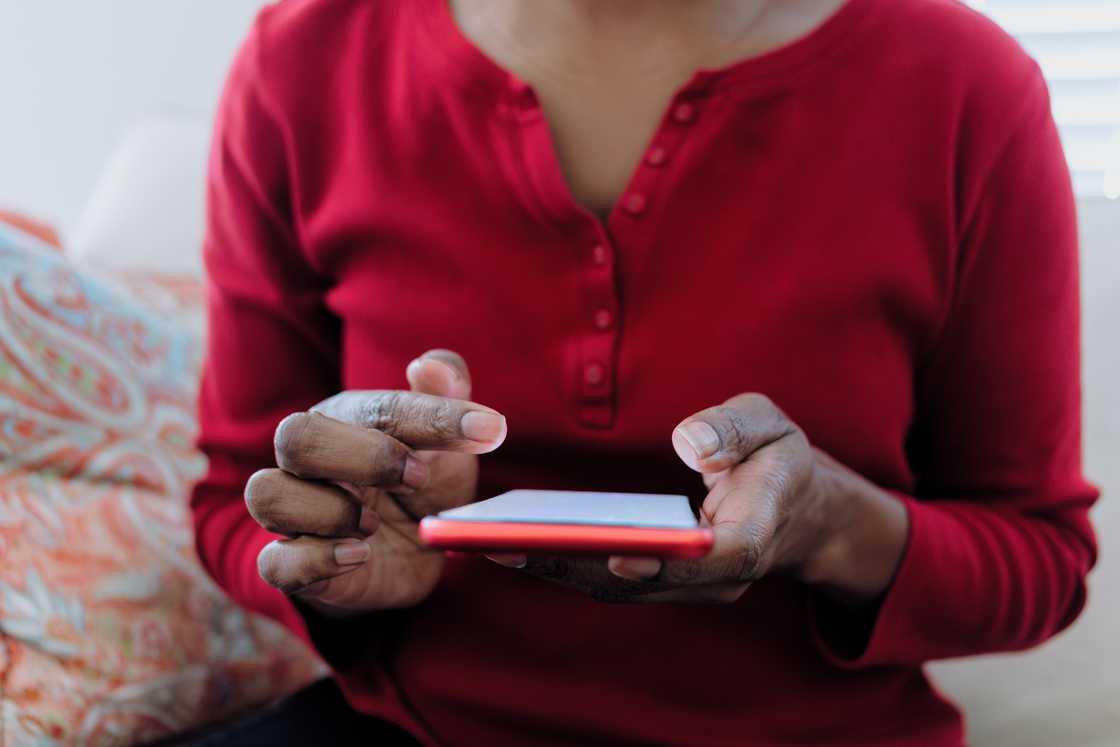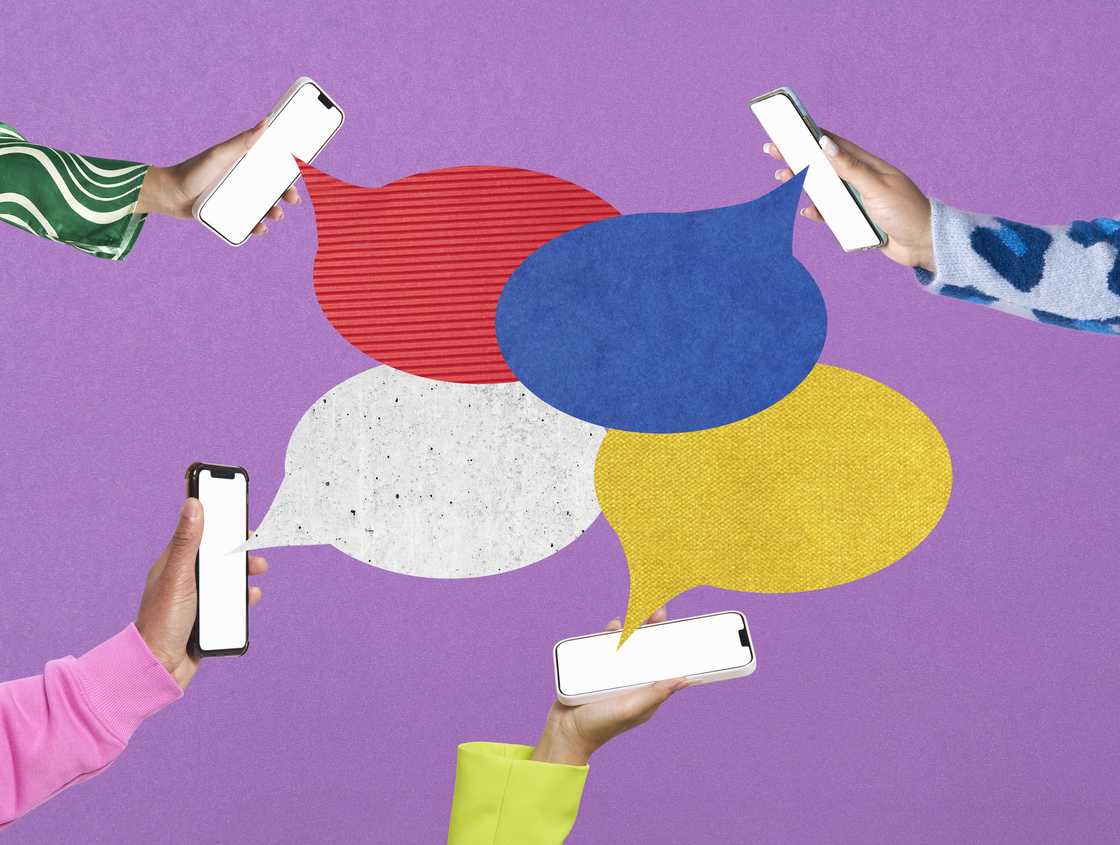She Was at the Supermarket; A Clone Texted Me — A Selfie and Code Word Saved Our Circle
The notification came as I was sorting the ledger in our Chat group. “Please send now, sisi. The supplier is at the gate.”

Source: UGC
It was my sister Zinhle’s voice, urgent, trembling, familiar. I didn’t hesitate. I opened the Bank app, verified the details, and rushed the EFT. R78,200. Our stokvel’s entire quarter savings for the Christmas grocery bulk buy.
A minute later, she sent another voice note. “They say they’ll leave if it’s not cleared, Thuli.” My hands shook as I confirmed the payment, heart pounding like I was the one at the gate.
Five minutes later, my phone rang again. This time, it was Zinhle herself. She was laughing, and the background noise was trolleys and a cashier saying, “Next, please.”
“I’m at the supermarket, why are you crying?” she asked.
That was when my stomach turned to stone. Because if she was at the shop, then who was the Zinhle on my phone? And how did she know everything, from our circle name to the exact supplier’s number?

Source: Getty Images
My name is Thulisile Dlamini. I am 30 and was born and raised in Pimville, Soweto. I’m a marketing assistant by day and a treasurer by trust.
Our stokvel, Amadlozi Circle, was born during lockdown. Twelve women, ranging from nurses to hairdressers, saved monthly for bulk groceries and funeral cover. We laughed, prayed, and called ourselves the tribe that feeds each other.
Every December, we would buy rice, maize, oil, and sugar in bulk and store them in Mama Gloria’s garage. When the economy tightened, our stokvel became a safety net not just for food but also for dignity.
I was the youngest, but they trusted me with digital tasks, including setting up EFTs, keeping track of receipts, and recording everything in the ledger app.

Source: Getty Images
Zinhle, my sister and oldest friend, wasn’t in the circle, but she was our go-to supplier liaison. Her charm got us better discounts. She ran a small catering business, and her social media posts were full of smiling deliveries and Zulu proverbs.
She always said, “Umuntu ngumuntu ngabantu” (a person is a person because of people), and that spirit built our trust.
So when her voice came through that Friday afternoon, I didn’t question it.
I remembered how a delay had cost us a delivery the previous year because the supplier refused to wait for “committee confirmations.” We lost R2,000 in late fees. I swore never again.
That day, I was home early. Power cuts were threatening, and we’d just cleared the monthly reconciliation. Everyone had sent their contributions. R78,200 sat ready in the account.
When the voice note came through, I didn’t even think to video call.

Source: Getty Images
It was Zinhle’s voice, the same tone, and the same small click in her speech when she said, “Please.” She even mentioned our late uncle’s funeral list, asking if I’d used the same bank account name.
There was no reason to doubt her.
Until that second call.
Until her real laughter came from the shop's queue, casual, happy, like she hadn’t just sent a desperate message.
And I realised, with ice running down my spine, that someone had cloned her.
I froze.
“Zinhle,” I whispered into the phone, my voice breaking, “you just asked for money.”
“What money?” she said, frowning through the line.
The group notifications were already pinging. Nomsa had seen the transaction screenshot I posted, which is proof that I’d done my duty.
“Thuli, we said the supplier comes tomorrow,” Nomsa typed. “Why did you pay now?” I read the words again and again, my breath caught between disbelief and shame.

Source: Getty Images
I opened the voice note. Played it loud. Everyone in the group confirmed, “That’s Zinhle’s voice!” Same laughter, same background noise that sounded like her house.
But the real Zinhle was already sending me selfies, one of her at the shop, holding yoghurt cups. Timestamped.
That’s when panic turned to horror.
I tried calling the number from the voice note. It was a newly registered Business Account with Zinhle’s exact profile photo and the same status: “Catering is love made visible.”
Within minutes, the number vanished.
I rushed to the bank. They confirmed that the funds had gone through to a bank account, one that was opened less than a week ago. “Ma’am, we’ll lodge a recall,” the consultant said gently. “But chances are small. Scammers move fast.”
My body felt heavy, my ears hot.

Source: Getty Images
By evening, the whole circle was gathered in our group chat, the mood sour and sad. Nomsa was angry, but mostly heartbroken. “We trusted the process, Thuli. You trusted too much.”
I typed apologies until my thumbs hurt.
Later that night, Zinhle came over, holding her phone with trembling hands.
“Thuli,” she whispered, “that’s me. That voice, it’s my video clip. Someone spliced it.”
She showed me one of her old videos, a skit in which she said the exact phrases: “supplier,” “please send,” “they’re waiting.” Only now did the voice note have a new context and urgency added.
We reviewed her video comments, trying to see if anyone had scraped information. Then I remembered something chilling. Two weeks earlier, I’d accidentally made public a photo of our funeral contribution list in the group. It had full names, phone numbers, and bank references.

Source: Getty Images
The fake Zinhle used those names and even called me “Thuli Dlamini, our treasurer,” like an insider.
The next morning, I went to SAPS Orlando West. The officer listened quietly, then sighed. “You’re not the first,” he said. “Deepfakes. They’re getting better.”
He opened a case but warned that recovery was rare. Still, we had to try.
Later, I called a friend at Wits, Lebo, a computer science student. He analysed the voice note and zoomed in on tiny clicks and waveforms.
“There’s artifacting,” he said, pointing at his laptop. “See this? The breathing pattern doesn’t match. It’s AI-generated.” My heart sank, and swelled with anger.
Someone had taken my sister’s face, her voice, her kindness, and used it to steal from women saving to feed their families.
Lebo’s report became our lifeline. He wrote a summary explaining how deepfakes are created — by pulling audio samples from public videos and combining them with AI to mimic emotion and tone..

Source: Getty Images
He demonstrated how the scammer had likely laid the groundwork for their plan weeks earlier by joining community pages, commenting on posts, and establishing familiarity.
Even the funeral list had helped them appear “real.”
We took the evidence back to SAPS, who filed it under the Cyber Fraud Division. But the bigger twist came from the bank. Two weeks later, they called. R21,000 had been frozen in a mule account before the transfer.
It wasn’t everything, but it was a start.
We gathered at Mama Gloria’s house for an emergency meeting. The circle was broken, trust fractured like glass.

Source: Getty Images
Then Gogo Dudu, our eldest member, stood up. She said, “Technology is clever, but so are we.” She proposed a Gogo-proof safety protocol, simple, low-tech, rooted in language and presence.
First rule: Rotating the isiZulu passphrase, which she could only set, changed every meeting. Second: Mandatory video calls before any payment, with the ledger in frame and handwritten one-time codes. Third: Dual approvals, both the treasurer and the secretary must sign off. Fourth: No EFTs after 5 p.m. Fifth: In-person voucher cash-outs only, no direct supplier transfers.
We called it our “Amadlozi Shield.”
Zinhle cried as we wrote the new rules on a poster:
“NO VOICE NOTES. NO RUSH. NO EXCEPTIONS.”
Then, to heal the damage, we did something powerful. We took the story public.
With Lebo’s help, we demoed deepfakes at our church youth group and at taxi ranks, showing how easy it is to fake voices. People gasped as they heard cloned pastors and politicians.

Source: Getty Images
Soon, even local radio invited us to share.
Through it all, our circle began to trust again, not because of technology but because we made rules that honoured both old wisdom and new threats.
The months that followed tested us. We paid a small six-month levy to recover what was lost. The R21k from the bank became our seed. Every member contributed an additional R600 each month until the gap was closed. By December, we were whole again.
When our groceries arrived, neatly stacked and labelled, tears filled our eyes. It wasn’t just about maize and sugar. It was about resilience.
Zinhle had changed, too. She deleted old posts and made new ones teaching digital safety. Her first video went viral: “If they rush you, they rob you,” she said, " even if it sounds like your sister.”

Source: Getty Images
Lebo helped us create a workshop for township stokvels. We showed the elders how to spot suspicious voice notes. We became the “techwise sisters” of Soweto.
The SAPS case was still open, but what mattered was that we’d built something more substantial, trust fortified by boundaries.
I learned to forgive myself. It took weeks before I could touch the ledger again without shaking. But when I finally wrote our balance in blue ink, I felt something lift, guilt turning into gratitude.
One evening, as we closed our meeting, Gogo Dudu smiled. “You see, Thuli, Amadlozi (our ancestors) let us learn the hard way so we could teach others.”
And she was right.
A few weeks later, we were invited to a community expo. Our stand had one message written above the kettle:
“NO VOICE NOTES. NO RUSH. NO EXCEPTIONS.”

Source: Getty Images
Women approached us in tears, telling us how they had almost sent money after falling victim to similar scams. The bank even invited us to speak at a customer safety forum.

Read also
Nomcebo Zikode receives a Rolex and Cartier bracelet for 40th birthday, SA gushes: "She’s deserving"
When I sat there, microphone in hand, I thought back to that day—the selfie, the panic, the shame. And I realised that sometimes, the same technology that tricks us can also save us if we use it right. Because that selfie, a simple photo taken in a grocery store, was proof of life, proof of truth.
It was the thing that separated my sister from her clone. And it saved our circle.
I still keep that selfie printed inside my ledger. It reminds me that trust must evolve. It can’t just be love and loyalty anymore. It must also be verified.
What broke us wasn’t gullibility. It was speed—that rush to act before thinking, the same rush that scammers exploit.

Source: Getty Images
We were raised to help first, question later. But in the digital age, that kindness can be weaponised. Now, before making any payment, I whisper our new mantra: “Thatha isikhathi sakho, Thuli” (Take your time, Thuli).
And I do. Because taking time saves us, and sharing our stories may save others.
When I look around at our circle now, women laughing, phones in hands, screens filled with video calls and codes, I see a new kind of unity. Not blind trust, but informed trust.
So here’s the lesson: Even in a world of deepfakes, the truth still leaves fingerprints, in a smile, a shadow, or a selfie.
We just have to slow down long enough to see them.
So I leave you with this question: If the same voice you loved cried for help, would you pause to check, or would your heart override your head like mine did?
This story is inspired by the real experiences of our readers. We believe that every story carries a lesson that can bring light to others. To protect everyone’s privacy, our editors may change names, locations, and certain details while keeping the heart of the story true. Images are for illustration only. If you’d like to share your own experience, please contact us via email.
Source: YEN.com.gh










